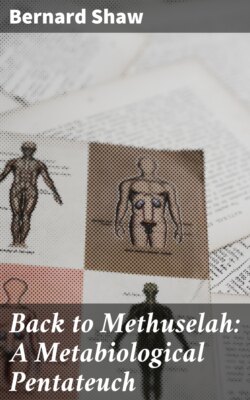Читать книгу Back to Methuselah: A Metabiological Pentateuch - Bernard Shaw - Страница 14
На сайте Литреса книга снята с продажи.
VOLUNTARY LONGEVITY
ОглавлениеTable of Contents
Among other matters apparently changeable at will is the duration of individual life. Weismann, a very clever and suggestive biologist who was unhappily reduced to idiocy by Neo-Darwinism, pointed out that death is not an eternal condition of life, but an expedient introduced to provide for continual renewal without overcrowding. Now Circumstantial Selection does not account for natural death: it accounts only for the survival of species in which the individuals have sense enough to decay and die on purpose. But the individuals do not seem to have calculated very reasonably: nobody can explain why a parrot should live ten times as long as a dog, and a turtle be almost immortal. In the case of man, the operation has overshot its mark: men do not live long enough: they are, for all the purposes of high civilization, mere children when they die; and our Prime Ministers, though rated as mature, divide their time between the golf course and the Treasury Bench in parliament. Presumably, however, the same power that made this mistake can remedy it. If on opportunist grounds Man now fixes the term of his life at three score and ten years, he can equally fix it at three hundred, or three thousand, or even at the genuine Circumstantial Selection limit, which would be until a sooner-or-later-inevitable fatal accident makes an end of the individual. All that is necessary to make him extend his present span is that tremendous catastrophes such as the late war shall convince him of the necessity of at least outliving his taste for golf and cigars if the race is to be saved. This is not fantastic speculation: it is deductive biology, if there is such a science as biology. Here, then, is a stone that we have left unturned, and that may be worth turning. To make the suggestion more entertaining than it would be to most people in the form of a biological treatise, I have written Back to Methuselah as a contribution to the modern Bible.
Many people, however, can read treatises and cannot read Bibles. Darwin could not read Shakespear. Some who can read both, like to learn the history of their ideas. Some are so entangled in the current confusion of Creative Evolution with Circumstantial Selection by their historical ignorance that they are puzzled by any distinction between the two. For all their sakes I must give here a little history of the conflict between the view of Evolution taken by the Darwinians (though not altogether by Darwin himself) and called Natural Selection, and that which is emerging, under the title of Creative Evolution, as the genuinely scientific religion for which all wise men are now anxiously looking.
